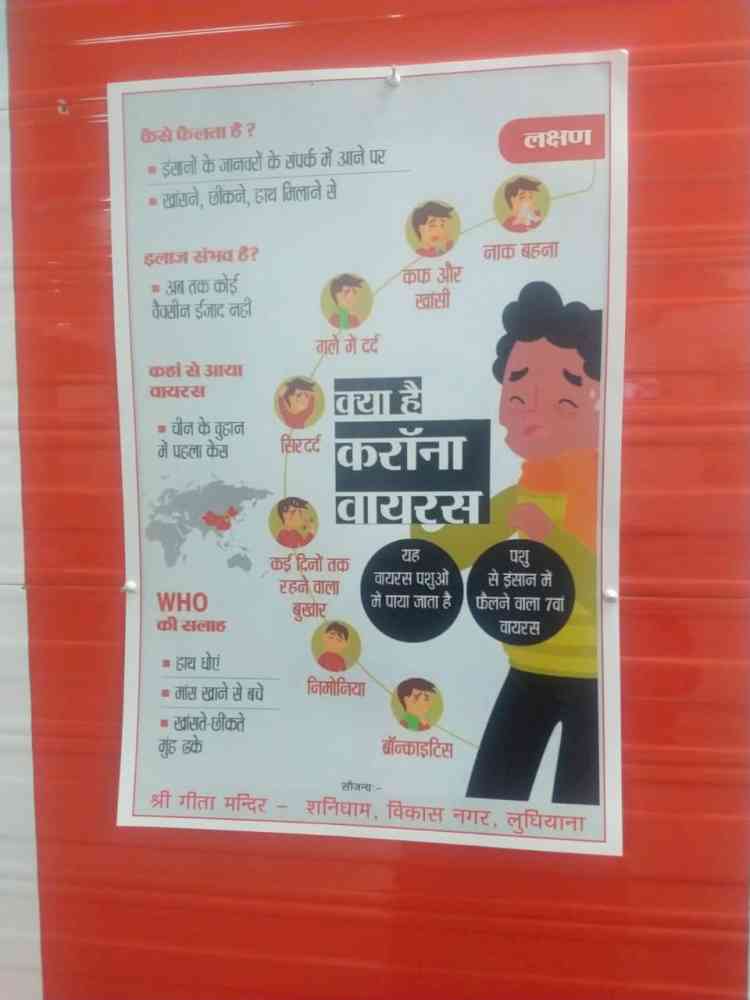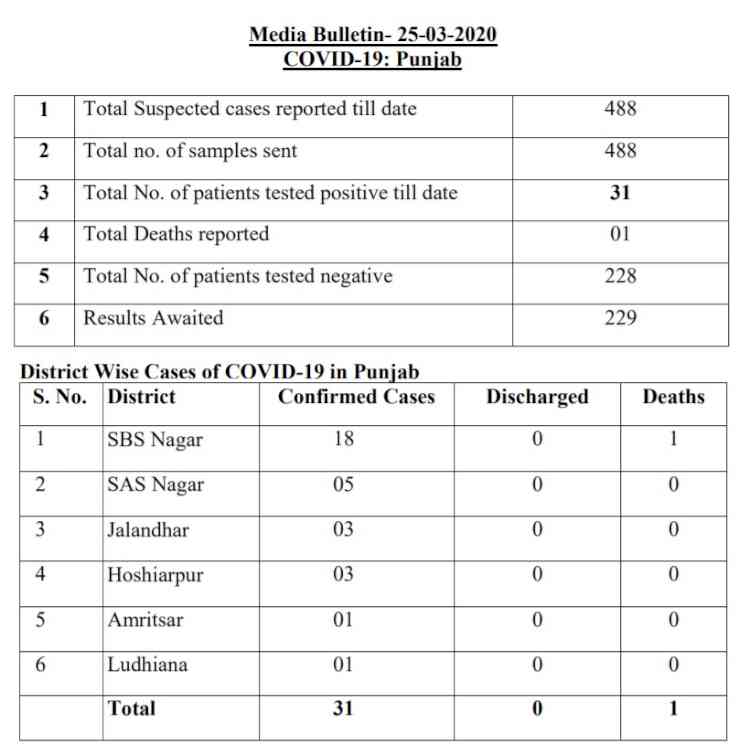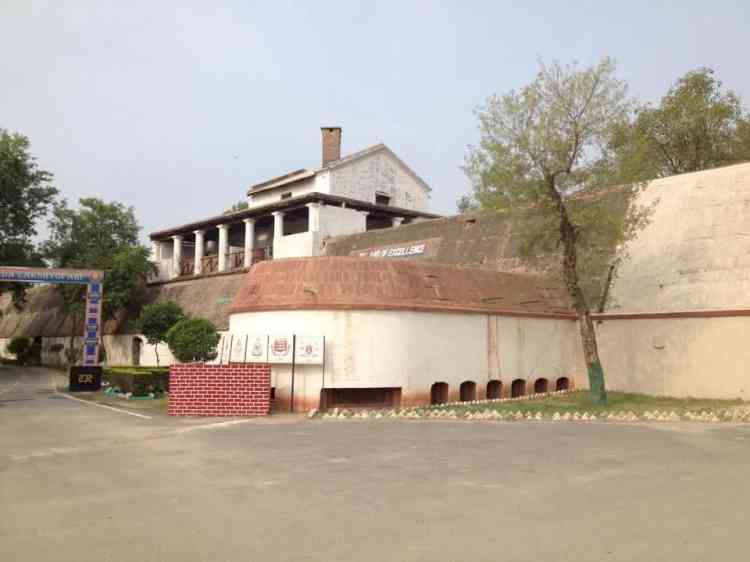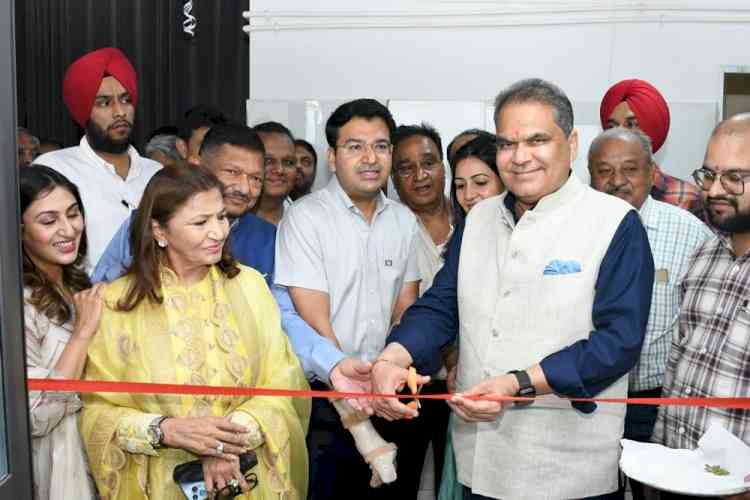Punjab police in mission mode to facilitate door-to-door supplies through innovative methods
DGP says district wise tie-ups being done with Zomato, Swiggy, Verka, Amul, mandi pradhans, chemist associations etc alongwith district administrations

 Chandigarh: Amid tighter restrictions and controls as part of the anti-COVID curfew/lockdown in place, the Punjab Police on Wednesday went into mission mode to launch innovative and indigenous initiatives across districts to facilitate door-to-door supply of essential goods through strategic tie-ups with Zomata, Swiggy, Verka, Amul, Mandi Pradhans, Chemist Associations etc.
Chandigarh: Amid tighter restrictions and controls as part of the anti-COVID curfew/lockdown in place, the Punjab Police on Wednesday went into mission mode to launch innovative and indigenous initiatives across districts to facilitate door-to-door supply of essential goods through strategic tie-ups with Zomata, Swiggy, Verka, Amul, Mandi Pradhans, Chemist Associations etc.
As a result of the initiatives taken by the district police, door-to-door supply of essential goods like medicines, grocery, eatables had started in many of the districts in the state,
while similar delivery mechanisms were being worked out in others too. Passes were also being issued to authorized vendors for the supply of essential goods, according to DGP Dinkar Gupta, adding that for home delivery of Medicines, in particular, necessary tie-ups are being made with the respective Chemist Associations, so that orders can be taken on phone and home delivery is accordingly undertaken.
The DGP appealed to the people and the media to show some patience as arrangements on such a large scale need time for implementation. The police was taking prompt action on any information that comes to their notice the from social media, he said, disclosing that prompt
arrangements were made for delivery of diabetic medicines to a Jalandhar family after they had tweeted for help.
Strict enforcement of the curfew had curtailed the number of FIRs for violations to 74 today against yesterday’s 230, with a 38,468-strong police force on the ground to enforce the restrictions while ensuring access to essential goods and services for the people, Gupta said. The violations of curfew were reported from Ludhiana City, Ludhiana Rural, Khanna, Ropar, Sangrur, Patiala, Jalandhar City, Hoshiarpur, Kapurthala, SBS Nagar, Mansa and Ferozepur.
Responding to the DGP’s directions to think out-of-the-box, Commissioners of Police and SSPs in several districts had come out with innovative ways to ensure that essential commodities reach the citizens. The DGP had issued certain directives to the top officials soon after the announcement of the curfew by Chief Minister Captain Amarinder Singh and the nationwide lockdown by the Prime Minister. He had asked them to make suitable arrangements for door-to-door delivery of essential goods and services, and to ensure smooth functioning of delivery boys, rehris, small motorized vehicles etc.
In Amritsar and Ludhiana cities, 650 persons had been engaged from Swiggy for home delivery of the essential goods, while in District Patiala, home delivery of essential commodities was being ensured in coordination with the delivery boys from Zomato and Swiggy.
As many as 100 trolleys containing essential commodities were dispatched across Sangrur district today by engaging the services of local volunteers, said the DGP adding that in District Tarn Taran, Milk producing entities like Verka and Amul have been roped in for ensuring decentralised distribution of Milk following proper Social Distancing measures.
Officers of Milk plant Verka have been liaised with and they have assured that their 700 vendors will undertake door to door supply of milk in Amritsar City too, with the Commissionerate Amritsar directed to issue the necessary passes, said Gupta. Further, for Fruits and Vegetables in Amritsar City, liaison has been established with the merchant leader (Pardhan) of the Sabzi Mandi. As a result, around 200 vendors from the Mandi will undertake door-to-door delivery of Vegetables to the residents of each colony and area in Commissionerate Amritsar. Similarly, the Pardhan of the Mandi has assured that around 100 vendors will be deputed for undertaking door-to-door supply/delivery of Fruits.
In district Khanna, Vegetables and Fruits are being sold out door-to-door via Rehris, after getting the same from Mandis. For dry rations, necessary tie-ups with the Kiryana stores have been made, and they are also taking orders on phone and ensuring home delivery. Information about the availability of the home delivery services is being disseminated through the WhatsApp groups.
In Sri Muktsar Sahib district, for dry rations, a meeting with Pardhans of Kiryana merchants association was held. Since most of them have running accounts of their customers, in each mohalla & locality, they have been asked to collect their orders on phone & keep all parcels ready by 5 pm of the day. Thereafter, they will be allowed to go door to door, clubbing one cart/ Chhota Haathi per ten shops, between 5 & 6 pm. Movement of these vehicles will be regulated by respective PCRs of each locality to ensure confinement of customers/ Residents, said the DGP.
The DGP said certain issues were being faced by the police teams in certain areas, including shortage of essential items and LPG etc, daily visits at government hospitals by drug addicts with de-addiction centre cards seeking medicines, pressure from wheat farmers for opening of pesticide markets & shops, demand from potato growers for safe passage and transportation for supply of their crop to other states, among others.
All efforts were being made to resolve these concerns at the earliest, assured the DGP, adding that the police officials themselves had suggested various means to address these issues in their respective districts. Some of the key suggestions included roping in of NCC, volunteers, private/retired doctors and nurses to augment health services, using Public address system to make people aware of delivery schedules etc, allowing wholesalers of sanitisers and masks to open shops at fixed times for supply to retailers, permission to private doctors to attend to routine ailments of newly born babies, old age peoples and pregnant ladies, strong measures by PR departments to counter rumours, expansion & updation of vendor list, and random checking of Covid-19 to prevent community spread.
NOVEL CORONAVIRUS (COVID 19): WORK TO ISSUE TEMPORARY LICENSES TO OPEN KIRYANA SHOPS STARTS IN CITY
Ludhiana: In view of lockdown in the city, the Municipal Corporation Ludhiana have started issuing temporary licenses to owners of Kiryana shops so that they can open their shops. While providing information, MC Commissioner Mrs Kanwal Preet Kaur Brar informed that the MC has deputed its staff in police stations and police posts for this purpose.
She informed that the concerned superintendents have been directed to do this work on priority basis. She informed that the staff would issue these licenses from 9 am to 4 pm to daily. Mrs Brar has appealed to the shopkeepers to visit their concerned police stations/police posts for getting these temporary licenses made so that common man can get all essential commodities without any problem.
CAPT AMARINDER ISSUES NEW ORDERS TO FACILITATE SUPPLY OF ESSENTIALS, MANAGEMENT OF CURFEW
Chandigarh: To further streamline the curfew management and facilitate supply of essentials in the curfew-bound state in the light of the 21-day national lockdown which started today, Punjab Chief Minister Captain Amarinder has issued a fresh set of directives to the police and civil administration, including detailed instructions for issuance of passes to maintain the critical systems and services in order to ensure that the people are not inconvenienced in these difficult times.
The Chief Minister has constituted a Committee under the chairmanship of ACS (Industry & Commerce) to oversee the procurement processes for all CoViD-19 related items. Taking cognizance of the need to ensure timely supply of critical materials and equipment to government hospitals, PHCs and CHCs, the DCs have been asked by the Chief Minister to contact PSHFW and MD, PHSC, with the facility of sending advance indents to facilitate early procurements. These materials include PPE kits, masks, medicines etc.
At the same time, Captain Amarinder has ordered that the requisite protocol issued by the Health Department for testing of suspected cases should be followed meticulously. Further, compliance of protocol issued by the Health Department vide Letter No. ISDP/PB/2020/660-1725 dated 22/3/2020 should be strictly ensured.
Giving the highest importance to tracing all international passengers who arrived after 10th March 2020, the Chief Minister has directed that the work should continue unbated. He has also directed the health department and police to ensure further monitoring of those already traced and placed under home quarantine.
While continuing with its earlier curfew orders, the state government will take all possible steps to avoid any undue inconvenience to the providers of essential services and the general public, the Chief Minister assured the people. He has directed the police and administrative officials to ensure that door-to-door delivery of essential services is maintained for the desired/prescribed period and it may, as far as possible, be further streamlined with the assistance of e-commerce companies/service providers.
Volunteers may also be engaged, if necessary, for ensuring prompt door-to-door delivery of essential services and commodities, said the Chief Minister. The providers of essential services whether individuals (hawkers/delivery boys) or institutions should be allowed to operate for fixed duration but on specific permissions and after observing required health safeguards, he added.
For special goods trains, which have been arranged to move food grains out of the State to ensure adequate storage space for the coming wheat crop, the Department of Food has issued complete protocol. DCs should ensure the movement of these trains in keeping with these guidelines and the protocol issued by the Food Department.
The Chief Minister has also ordered sanitization of affected or vulnerable areas, etc for which guidelines have been issued by the Department of Health & Family Welfare may be undertaken in both concerned towns and villages.
On directives of the Chief Minister, Secretary Arun Sekhri on Wednesday issued revised curfew management guidelines to all the Divisional Commissioners, Deputy Commissioners, Commissioners of Police/SSPs, as well as other senior officials concerned with managing the situation. The DCs have been asked to ensure strict compliance of the guidelines.
With the civil administration and police working in close coordinate, DGP Dinkar Gupta also issued clear instructions to his officers to ensure efficient delivery mechanisms and processes in the light of the curfew with no relaxations already in place in the state, and the subsequent national lockdown announcement by the Prime Minister. He emphasized arrangements for door-to-door delivery of essential goods and services as the only option in the given situation and asked the CPs and SSPs to ensure that functioning of delivery boys, rehris, small motorized vehicles etc is facilitated to ensure smooth supplies.
As per the revised curfew management guidelines, government offices that have been designated in Government of India’s order will be allowed to remain open with skeletal staff.
In order to ensure supply of other essential services, specific State Government offices may also be required to remain open with minimal functional staff. Such employees of the State Government and those employees of Government of India that have been allowed to report on duty as per Government of India’s order will be allowed to travel from home to office on their institutional Identity Card, and specific curfew passes will not be necessary, the revised guidelines states.
It is specifically provided in the guidelines that for employees of Governments including PSUs and SPUs, of Haryana, Punjab and UT of Chandigarh who are residing in Mohali district (especially Mohali and Zirakpur) and are facing acute problems in reaching their offices, located in Chandigarh and Panchkula, it has been decided that they may be allowed to commute to their offices for official duty (not with their families or in groups) by showing their Official or Institutional Photo ID Cards and they would not be required to obtain special curfew passes.
All other Government employees will be directed to work from home and remain available on call should any such need arise.
While there would continue to be no general relaxation in curfew, if it is decided by the district administration in due course to relax it in a selected area, due care must be taken to avoid overcrowding and to observe prescribed social distancing, according to the guidelines.
The permissions may be given in the following manner:
* a) Permits may be issued for fixed period that may be the period of curfew, to all those exempted by GOI/GOP. Such permits can even be in the form of authorization letters;
* b) Institutional Permits to the exempted institutions such as media houses, IOC/HPCL, Post Offices, Banks, Railways, Petrol Pumps, LPG Suppliers etc. should be given through specific letters attaching therewith list of employees of each of such institutions. These employees should then be allowed to go to office in duty hours on their institutional identity cards but they may not be allowed elsewhere such as markets, etc for their personal work;
* c) Those institutional permissions, which are issued for maintaining essential supplies (in the form of authorization letters - see specimen as per attachment) should clearly mention so and would be valid across the State;
* d) Individual passes may be given only in an emergency and if so required, such an individual may be permitted to use vehicle but for a given purpose only; and
* e) Healthcare establishments (Hospitals, Nursing Homes, PHCs, CHCs), both private and government and their employees, should be given a general permission to operate and their employees may be allowed to commute for duty/work on their institutional Identity Card.
To simplify the process, the issuance of passes has been tasked to various officers as follows:
* • DFSC: Food, ration and grocery shops, transportation of food grains, mandi labour and procurement related works;
* • Dy. Director Horticulture: Fruits and Vegetables;
* • Dy. Director Animal Husbandry: Milk Vendors and Suppliers and related movements;
* • GM DIC: Industries/industrialists/industrial labour;
* • DMO: Hawkers of any kind; Mandis and Purchase Centers, Arhtiyas;
* • CAO: Farmers and harvesting related movements; and
* • General passes for individuals and others: Asst. Commissioner (Gen.), SDM, Tehsildar or any other person specifically authorised by DC.
For each of the above, DCs should declare them authorised signatories and inform the district police accordingly. Due record of the passes to be issued by the authorized signatories must be maintained, as per the revised guidelines.
For point-to-point movement of individuals or providers of essential goods and services, the passes can be issued by the authorised signatories at origin, clearly giving address of destination and purpose of traveling. Such passes should be honoured both during transit and at destination but such pass holders should not be allowed to stop or go anywhere other than the specified destination. Government of India in its order has also emphasized maintaining supply chains of essential goods and commodities. Vehicle number and mode of transportation should also be specified. However, movement of people in groups should be avoided even from point to point.
For individual emergencies, DCs should continue to follow up and facilitate the common man through helplines already established in the districts. The number of helplines and persons attending on such lines may be increased and properly publicized, the guidelines state.
For procurement of wheat, ACS (Dev.) and PSFS would issue a comprehensive mandi-wise plan in due course. Likewise, for harvesting of potatoes, ACS (Dev.) would issue necessary guidelines by Friday, the 27th March 2020.


 cityairnews
cityairnews 








